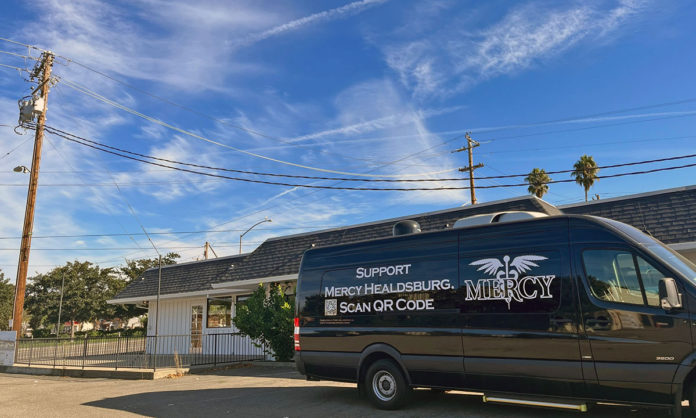
A prominent Sonoma County dispensary operator who failed to earn approval from the city of Healdsburg last November to operate a cannabis business in town has filed suit against the city to start all over—contending they were unfairly excluded from receiving one of the permits.
Mercy Wellness operates two dispensaries in Sonoma County at present, in Cotati and Santa Rosa, and has a partial interest in a third. Its application was one of eight received by the city during the 2023 process for permission to apply for a cannabis business permit in Healdsburg.
The chosen location was the highly visible corner of Dry Creek Road and Healdsburg Avenue, in the building formerly occupied by Di Vine Pizza but long since vacated.
According to a summary that accompanied the court filing, the suit filed on Feb. 8 in Sonoma County Superior Court holds that “the City Council’s decision was tainted by conflicts of interest, violated zoning laws, violated California procurement laws, constituted an abuse of discretion, and violated the Brown Act,” which mandates transparency in decision making by local governments.
The city has not commented officially on the suit, with Assistant City Manager Andrew Sturmfels (who oversaw the city’s cannabis selection process) saying the city has not yet been served and has thus not received a copy of the complaint. Though the suit was filed a month ago, certification of the suit and service to the principals can sometimes take weeks.
The Process
Two businesses received the council’s approval, JF Healdsburg (dba Jane) and 465 Retail (dba Solful), at the Nov. 13 meeting. Their selection came following presentations by the eight applicants and 90 minutes of public comment. The council then took a 15-minute “bio-break” (as it was termed at the time), reconvening to begin its public deliberation.
A straw poll was then requested by then-mayor Ariel Kelley, to gauge the sentiment of the council, which found that all five of the council members listed both Jane and Solful as among their three favorites. Chris Herrod also listed Mercy Wellness as among his choices, and the other council members named SPARC as their third choice. Given the unanimity of the two operators, Jane and Solful were chosen.

Although the on-dais consideration by the council was brief, it followed extensive public comment—most from employees or customers of the applicants—and a months-long process of application and review, conducted by a city staff committee and the consulting firm HdL.
In the suit, Mercy Wellness CEO Brandon Levine drove home the point that his company was the highest-scoring applicant after the third phase of selection. At that point Mercy scored 97.06%, followed by Solful with 94.94% and Jane with 90.94%.
On the other hand, Mercy scored lowest following the Phase 2 score with 95.42%, while six of the eight applicants scored 100%. Solful also scored less than perfect, at 98.75%. SPARC was initially disqualified at the Phase 2 level, but after appealing and receiving a second hearing was able to lift its score to 100%.
The selection of the successful applicants, however, is ultimately the decision of the city council, not the staff, but Mercy contends that both Jane and Solful should have been disqualified by missing components of their applications. Solful should have not been allowed to include a proposed parking area not on the permitted property (at 465 Healdsburg Ave.) but next door, and Jane should have been bumped because its application lacked a required zoning clearance letter.
A related charge was that the mayor at the time, Ariel Kelley, received campaign contributions from some of the successful applicants for the Assembly District 2 race she later entered. She announced her candidacy following the city’s cannabis process, but state law prohibits a candidate receiving donations 12 months prior or following an official action. As such, they say, she should have recused herself at the time or returned the campaign donations to avoid conflict of interest.
The Suit
At the center of the Mercy suit, and Levine’s argument, is the decision process itself on Nov. 13. The bulk of the discussion was a series of eight-minute presentations by the eight applicants, and the public comment that followed.

“They said, ‘We’re going to take a break to use the restroom,’” Levine told the Tribune. “They all disappeared, and then they came back after 12 or 15 minutes and they said, ‘We’re going to decide who gets these applications.’”
Though the city council members recall using the time to go to the bathroom, Levine suspected they met then, or previously, to surreptitiously agree on their favored operators.
“They gave no reason for the applicants that they chose, which leads me to believe that that decision was unanimously made either at that meeting or at another meeting,” Levine said.
Following the council’s Nov. 13 decision, Mercy sent two formal protests to the city, characterized as “cure and correct” letters. Dated Dec. 5 and Dec. 22, these letters protested the decision based on similar terms eventually presented in the Feb. 8 lawsuit.
On Jan. 16, 2024, the city’s attorney, Samantha Zutler, provided an extensive response to the letters that discounted their legal validity, pointing out among other things that the missing Jane document was the city’s fault, and the donations to Kelley’s campaign did not meet the legal criteria for conflict.
“Your ‘protest letter’ is of no legal consequence,” Zutler wrote.
On Feb. 8, Sigrid R. Waggener of Manatt, Phelps and Phillips filed the Mercy Wellness suit, a Petition for Writ of Mandate and Complaint for Declaratory Relief.
A key charge in the suit is that the city council violated the Brown Act by not openly discussing their process in arriving at a decision, and alludes to the possibility that during their 15-minute break on Nov. 13, they reached a decision out of public view.
All council members who responded to the collusion question posed by the Tribune denied there had been any “bio-break” meeting to reach consensus. It might be noted that with a three-male, two-female constitution of the council, bathroom-break collusion is unlikely to have occurred.
Levine is adamant that there was wrongdoing, and his long efforts to develop a Healdsburg dispensary were unfairly dispensed with—efforts that included co-sponsoring Chamber of Commerce barbecues and participating in the Veterans Day parade.
“The government holds cannabis operators responsible for all of their actions to an extreme,” Levine said. “I think this is a time where we should hold them responsible for their actions as well. It has to be a two-way street.”








